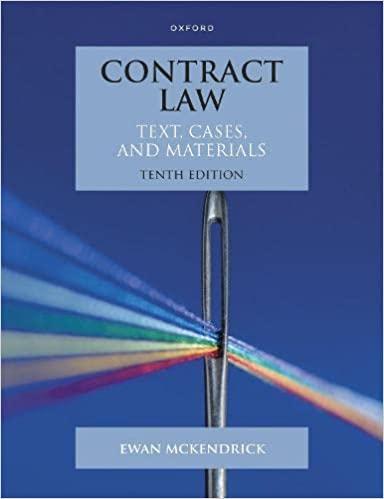Question
NDWC Investment Properties owned six properties in DeKalb County, Georgia, which were secured by fully amortized 30-year loans. At some point before the trial, NDWC
NDWC Investment Properties owned six properties in DeKalb County, Georgia, which were secured by fully amortized 30-year loans. At some point before the trial, NDWC entered into negotiations with Branch Banking and Trust (BB&T) to refinance their loans. In the course of the negotiations, BB&T offered NDWC a lower interest rate on all six of the DeKalb County properties but only for a five-year term. NDWC expressed concerns about moving from 30-year fixed loans to a series of five-year loans. According to NDWC, BB&T assuaged NDWC's fears by assuring them that BB&T would continue to refinance the remaining balance on the loans in four successive five-year terms at the current market interest rate. NDWC made an agreement based on the oral representations by BB&T. In December 2009, NDWC transferred the six DeKalb properties along with the loans to a newly created
company named Corso Properties. BB&T approved the loan transfer but explained to Corso that the term would be for one year instead of five because Corso was a new company. Corso asserted that it had made an oral agreement with BB&T that BB&T would refinance the remaining balance in successive five-year terms if Corso satisfied certain conditions. In 2011, BB&T refused to renew the loans despite Corso's claims that it had met the required conditions. Corso subsequently filed an action against BB&T, asserting claims of breach of Georgia's implied covenant of good faith and fair dealing when making contracts, fraud in the inducement, and fraud in the general. BB&T filed a motion to dismiss based on the plaintiff's failure to allege an independent breach of contract claim, as well as not pleading their fraud claims with enough details. The plaintiffs submitted an amended complaint which no longer contained the fraud in general claim but now included a breach of oral contract claim. BB&T responded with a second motion to dismiss, asserting that the amended complaint failed to state a claim upon which relief could be granted. The plaintiffs did not respond to the defendant's second motion to dismiss and the defendant was deemed unopposed. What arguments could the plaintiffs have made if they had responded to the defendant's second motion? Although the defendant won by being deemed unopposed, the court still reviewed the defendant's grounds for dismissal. How did the court rule on each of the three claims: Breach of Oral Contract, Breach of Duty of Good Faith and Fair Dealing, and Fraud in the Inducement? How do state laws affect this decision? Recall the WPH standards for Business Ethics. Although the court would have ruled in favor of BB&T by a matter of law, was the way BB&T acted ethical? [Corso Properties, LLC and WC Investment Property, Inc. v. Branch Banking And Trust Company, (2013 U.S. Dist. Lexis 137955).]
Step by Step Solution
There are 3 Steps involved in it
Step: 1

Get Instant Access to Expert-Tailored Solutions
See step-by-step solutions with expert insights and AI powered tools for academic success
Step: 2

Step: 3

Ace Your Homework with AI
Get the answers you need in no time with our AI-driven, step-by-step assistance
Get Started


